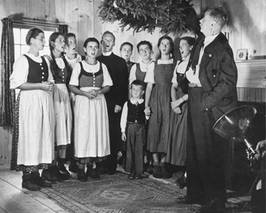
 NE OF MY FAVORITE little tomes to pull off the shelf on a somewhat regular basis is Around the Year with the Trapp Family by Maria von Trapp. Whenever our family stands upon the threshold of a new liturgical season my wife and I look for ways to bring the Faith alive at home for our children (especially through music), which usually means connecting our home life to the liturgical life of the Church, and this easy-to-read book provides us with ideas-a-plenty. Last Sunday was no exception, especially after our oldest son noticed the statues and crucifixes in church draped in violet to mark the beginning of Passiontide.
NE OF MY FAVORITE little tomes to pull off the shelf on a somewhat regular basis is Around the Year with the Trapp Family by Maria von Trapp. Whenever our family stands upon the threshold of a new liturgical season my wife and I look for ways to bring the Faith alive at home for our children (especially through music), which usually means connecting our home life to the liturgical life of the Church, and this easy-to-read book provides us with ideas-a-plenty. Last Sunday was no exception, especially after our oldest son noticed the statues and crucifixes in church draped in violet to mark the beginning of Passiontide.
For those of you who have never read this book, I encourage you to do so. Baroness von Trapp wrote the book in 1955 when the Liturgical Movement weighed heavily upon the minds and hearts of many in the Church, accompanied by a sincere desire to reawaken in men a love and appreciation for the Church’s Sacred Liturgy and its power to bear spiritual fruit in the lives of Her faithful. Maria’s family hailed from a country where, and an era when, God and the Sacred Liturgy were still the center of personal, familial and even national life, where the saving work of Christ in the Sacraments spilled copiously into everyday life. The Baroness’s work is simply her attempt to share with readers how her family lived its Catholic Faith, inspired by the Sacred Liturgy. While the customs she described might have been Austrian in flavor, she rightly noted they were Catholic in origin, and therefore didn’t necessarily belong to one nation or peoples.
I mention this book for several reasons today. First, I have often written how important it is for the family to sing at home, and how the Church’s music helps to form the faith of one’s children. Here one can read about a concrete example of this within a particular family. Secondly, I mention the book because I am somewhat envious of a family that had its own chapel (my wife and I are working on that), wherein our Lord resided in the Blessed Sacrament (my wife and I doubt that will ever happen), as well as a priest living with them for 25 years!
I am particularly struck by the Baroness’ love for the Church’s Liturgy. She wrote,“We always consider this the greatest honor for us, the singing family, the greatest reward for all the trouble that goes along with life in public, that we can sing for all the Divine Offices in church” (speaking of the Liturgies in Holy Week). The small parish church in Stowe, VT, where the family eventually settled, was fortunate indeed to hear the family sing the Office of Tenebrae on Wednesday of Holy Week. According to the authoress, the family sang the psalms of the first nocturne of Matins to their respective tones, while the antiphons were sung to Gregorian chant, Palestrina, Lassus and Victoria. The psalms of the second and third nocturnes were sung recto tono, while the family’s chaplain, Msgr. Franz Wasner and two of the von Trapp sons sang all of the lessons. Then followed the Office of Lauds.
I can’t imagine my family playing such an intimate role in the awesome ceremonies of Holy Week, but I am sure it made an awesome impression on the von Trapps. Obviously this is out of the reach of most families, but what if your family were to begin singing the great Passion Chorale, O Sacred Head Surrounded, each evening at the end of supper? Perhaps your family could include the opening line of the Reproaches in your night prayers as part of an examination of conscience or recited David’s great penitential psalm, the Miserere meus. If your children are fortunate enough to hear these in your parish they will make the connection between the Sacred Liturgy and everyday life. When they are weighed down by sin or perhaps far from the Lord (God forbid), they can call to mind the mercy of God and with David recite:
Have mercy on me, O God, according to thy great mercy. And according to the multitude of thy tender mercies blot out my iniquity. Wash me yet more from my iniquity, and cleanse me from my sin… To my hearing thou shalt give joy and gladness: and the bones that have been humbled shall rejoice.
Here’s a video of the family singing for your enjoyment—definitely not music from Holy Week!

